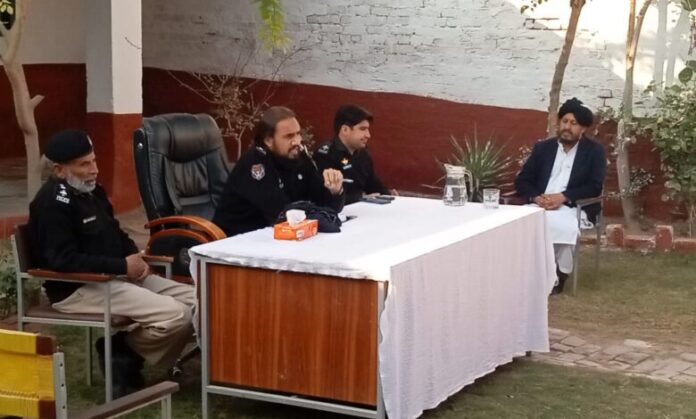
Rifaqatullah Razarwal
The Station House Officer (SHO) stationed at Parang Police Station in Charsadda district, Khyber Pakhtunkhwa, recently declared a series of prohibitions during a mosque announcement. These included bans on music, dancing by transgenders, ‘unnecessary’ outings after 10 pm, and the use of TikTok in the area.
Legal experts and human rights activists have criticized this move, asserting that such directives go beyond the police’s authority and violate the principles of the National Action Plan. They emphasize that the primary role of the police is to uphold existing laws in the country, not issue arbitrary orders.
During a religious ceremony at Ghazi Gul Baba Mosque, newly appointed Cadet SHO Abdul Ali made these announcements, expressing his disregard for encroachers, drug peddlers, and criminals. He asserted his fear of Allah and pledged to follow divine orders, emphasizing the importance of enrolling children in madrasahs.
Also Read: Defying Bullying and Unjust Expulsion: A Journalist’s Resilient Struggle
In a viral social media video, the SHO warned against singing, transgender dance parties, and night loitering, threatening on-the-spot punishment for those caught watching TikTok. Legal and constitutional experts have condemned these statements, deeming them a breach of human rights and police regulations.
Tariq Afghan, a lawyer from the Peshawar High Court, clarified that the police’s role is legal policing, not moral policing. Crimes should be addressed through proper legal procedures, where the court determines punishment based on evidence. Afghan stressed that citizens have the right to live their lives according to the Constitution and laws of Pakistan, and the police must operate within these legal boundaries and Sharia principles.
Police Authority and Legal Boundaries
Lawyer Tariq Afghan emphasized that it is not within the police’s duty to administer on-the-spot punishment or dictate admissions to madrasahs, restricting TikTok or Facebook use. He asserted that the SHO has exceeded legal limits, highlighting similar statements made during his tenure at Shahpur police station in Peshawar last November.
During that time, SHO Abdul Ali had declared that decisions within the police station’s limits would align with Sharia, completely banning music during weddings, with actions promised against violators.
Violation of National Action Plan 2014
Human rights activist and journalist Syed Shah Raza deemed the SHO’s statement a blatant violation of the National Action Plan 2014, targeting hate speech, extremism, sectarianism, and intolerance. Raza emphasized that personal decisions cannot be imposed on individuals, stating that the police have the authority to stop unlawful activities but should refrain from spreading extremist ideologies.
Raza urged the SHO not to assume regional supremacy, stressing that even the prime minister and army chief must adhere to the law and constitution.
Challenges in Countering Extremism
SHO Abdul Ali, recognized for his past role as an instructor at the Police Training Center Hangu, faces scrutiny for promoting extremist ideologies within the police department. Raza highlighted the challenge of countering extremism within the institution itself, urging the police to initiate a process of introspection and refinement.
Despite attempts to contact Charsadda police, no response was received. Sources suggest that the SHO has been summoned to the office, with authorities urging him to cease making illegal statements.
It’s worth noting that in July, Khanmai police station in Charsadda district had previously imposed a ban on shaving, leading to the suspension of the SHO by DPO Charsadda.







